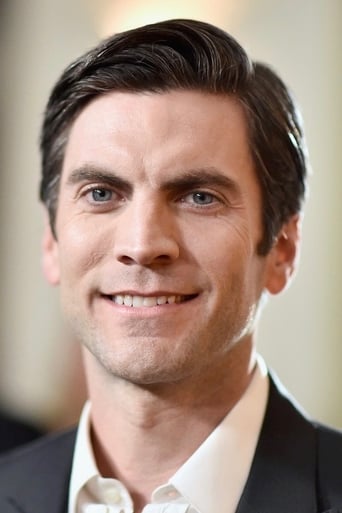GamerTab
That was an excellent one.
FuzzyTagz
If the ambition is to provide two hours of instantly forgettable, popcorn-munching escapism, it succeeds.
Raymond Sierra
The film may be flawed, but its message is not.
Cheryl
A clunky actioner with a handful of cool moments.
Spikeopath
"Thy Kingdom come, thy will be done, on earth as it is in heaven"Michael Winterbottom directs what is in essence a Western version of Thomas Hardy's The Mayor of Casterbridge. It's Sierra Nevada, California, 1867 and the pioneer town of Kingdom Come is thriving under the strict but effective rule of Daniel Dillon (Peter Mullan). Dillon came by way of a gold claim many years earlier by way of a trade, the barter? His wife and child. But now the past is about to catch up with him and Kingdom Come could well turn out to be his burning hell...Right off the bat it has to be said that The Claim is a difficult film to recommend, even to Western movie lovers. It's deliberately slow and purposely elegiac and ethereal. The literary aspects of the narrative positively sparkle, yet still this doesn't make the story any more vibrant, because Winterbottom and screenplay writer Frank Cottrell Boyce want to keep things in perspective. In a film that is awash with untold beauty, the snowy mountainous landscapes (Calgary standing in for California) stunningly photographed by Alwin H. Küchler, it's perpetually cold and bleak, the ice and snow a constant that marries up with characters who are deliberately hard to like.Technically this is one superior piece of work. Küchler and Winterbottom's panoramas are sublime, the town is strikingly designed by the art department, all wooded angles and smoking chimneys that are magnificently framed by the mountains, while the sound-mix thunders the ears and adds another dimension to the grubby realistic feel. Interior sequences are filmed in low lights, making the lamps spectral in sight, the costume design and the narrative strength of the town whorehouse (which is the fulcrum of proceedings) have a class about them that shines bright in the pantheon of modern era produced Westerns, while Michael Nyman's musical score is evocatively strong.The cast respond well to Winterbottom's requirements, Mullan, Wes Bentley, Sarah Polley, Milla Jovovich and Nastassja Kinski (how nice to see the latter twin euro beauties stripped of make up to show a natural era sexiness) all turn in charismatic and heartfelt performances. Narratively the film is driving towards Dillon's day of reckoning, his shoulders heavy with regret and his soul in desperate need of purging. In the interim we are privy to the lives and loves of the townsfolk, their foibles, faults and fancies, this while the town is alive with the arrival of the railroad company, who it is hoped by Dillon will make Kingdom Come prosper still further...Unfair comparisons have been drawn with Robert Altman's McCabe & Mrs. Miller. Yes, this is similar in style and execution, but why not just see it as the perfect companion piece to Altman's movie? Because it is. How about we instead look at the finale? Which draws a favourably thematic link to the brilliant Boetticher/Scott Western, Ride Lonesome. When push comes to shove, and in honest terms, The Claim is a film that for sure may be hard to love, but it sure as heck fire is a film that is easy to admire. Western fans should see it because they "will" take something positive from the experience. 8/10
Robert J. Maxwell
It's the Old West in Canada. A young man (Peter Mullan) trades his wife (Nastasja Kinski) and baby (later to turn into Sarah Polley) for a gold mine and years later becomes the benign dictator of the town of Kingdom Come. He builds a splendid home, along the lines of a slapdash version of Mad King Ludwig's.The railroad plans to pass by, but not through Kingdom Come. Along with the rush of people, there is Kinski, now terminally ill, and Polley, who does not know that Mullan is her father. Kinski asks for help and Mullan remarries her in what seems to be an attempt to undo the immoral act he earlier committed. Not that he's in any big hurry to get rid of his monumental stash of stone-heavy gold bars in the locked shed next to his house.Milla Jovovich is present as one of the more prominent whores in the flourishing cat house.You know -- whatever else this movie has or does not have -- it must be said that this is a talented line up of gorgeous babes. Kinski, Polley, and Jovovich. Murderer's Row of pulchritude. And Kinski, though now old enough to play a the mother of a grown woman, is stunning. Age cannot wither nor custom stale her. They all turn in professional performances too.It's all pretty tragic however. It's clear that Mullan is ridden with guilt and love but Kinski's destiny is fulfilled, so he's missed out on the most fruitful time they might have spent together. He's compelled to tell Polley that he's her real father and she stalks off into the snow without a word.Then there's that pesky railroad. Since it will run through the plain below, it leaves Mullan and his mountain empire high and dry. Everyone leaves Kingdom Come to establish the new railroad town down there -- somewhere.It's all too much for Mullan. He burns down the town he built and consigns himself to a snowy death.It's a very deliberately paced and realistic-looking Western. The clothes are suitably heavy and drab. The mountains are majestic and snow-veined but as cold and forbidding in their own quiet way as the people who populate the town. There is laughter and booze, but it all seems forced. Nobody's love is fully expressed. There's no operatic content.There's a little gun play too, but this is a Canadian movie and Canadian movies are always thoughtful, slow, a little dark, and lacking in scenes in which someone's head explodes or an arm is wrenched off or an eye gouged out. I can't even think of a Canadian film in which someone visits a dentist.I admire it for its location shooting and for the performances, however reined in they are by the script and direction. Ultimately it's a gloomy story. No one enjoys seeing someone utterly demolished in spirit on the screen, not even a miscreant like Mullan. At least he was capable of remorse.
liscarkat
Some of the things that make this a bad movie: I. The movie is confusing, either intentionally (pretentiously) or due to ineptitude.A. A flashback near the beginning of the movie gives no indication that it is a flashback. There's just a shot in which we see people we haven't seen before, without any verbal or stylistic suggestion that this is a scene from the past. The younger actors portraying Dillon and his wife in the flashback bear no resemblance to the actors playing the same roles in the present.B. Although approximately twenty years have elapsed since Dillon sold his wife, he appears to have aged at least thirty years, while she has apparently aged less than ten years. The two actors portraying the woman look so close in age that either of them could have played the part in both the present and the flashbacks. That would have alleviated a small amount of confusion.C. The two unfamiliar actors portraying Dillon and his right-hand man are approximately the same age, have the same build, are the same height, have the same style of gray beard, and wear the same style and color of clothing and hat.II. Much of the plot and the characters' actions seem unmotivated.A. Why does Dillon sell the woman and baby? Near the beginning of the movie, when we see him do this in a flashback, it makes a little more sense. We are led to believe that he has no more attachment to them than to hitch hikers he picked up along his way. His only description of their relationship is that he has "been dragging them across the country," and the woman barely protests. There is little or no emotion or hesitation. It's somewhat believable that he might trade them for gold. But what gives him the right to sell them? Does he own them? Much later in the movie we find out that he and the woman were married and the baby was his. Near the end of the movie, there is a vague implication that he was drunk when he sold them (although there was no hint of it in the flashback). Drunk or not, he must have been pretty angry at both of them for some reason we are never let in on.B. Why does Dillon move his house? It seems to be no more than a gratuitous action scene to give this soporific movie a moment of liveliness (like the pointless explosion of the survey party's supply wagon).C. Why do Dillon and many of the town's men go ballistic when the railroad engineer decides that the tracks can't go through their town? Did the railroad have a contract with them? Did the railroad owe them anything? Dillon and his men were not justified in showing up with rifles and threatening the railroad surveyors.D. Why does Dillon murder two railroad men, and why are there no consequences to him for this brutal, pointless act? There are at least two references to a sheriff in the town, yet he never makes an appearance. No one seems to be upset at all as a result of the murders.III. The actors use accents inconsistently. Both Dillon and Lucy sometimes have accents, and sometimes don't. Dillon, in particular, is ridiculous because at times he has almost no accent and then in the next scene he has a thick brogue that's barely understandable.IV. Anachronistic speech. "You're full of ****!" in 1867? V. Anachronistic hair styles.A. All of the women in the movie, be they prostitutes or not, have stringy, badly groomed hair hanging in their eyes. Try to find a photograph from the 1860s of any woman, anywhere, of any occupation or social class (including prostitutes) with hair like that. Either a studio portrait or a candid shot. You can't.B. Several men of the survey party have long, poorly groomed hair. This is not from the 1860s; it is left over from western movies of the early 1970s.VI. The railroad surveyors are portrayed as semi-literate ruffians. In reality, railroad survey engineers were college-educated, literate men (and real, 19th century college).VII. The railroad survey takes place in deep snow.A. How do they steady their tripods on the snow? B. They are measuring the snow surface, which, in the Sierra Nevada in winter, can be several yards deep. What use would that be? The ground surface would be incorrectly measured, and many prominent topographic features would be overlooked.VIII. The story is set in a mining town, with a large stamp mill next to the hotel and residences where most of the action takes place, yet the mill is obviously never running and the miners seem to spend all of their time carousing and whoring. If this mill had been in use we would have heard it roaring and seen it pouring smoke night and day throughout the movie. Apparently no mining is going on at all. Only the prostitutes are employed.IX. General implausibility.A. A large, wood-framed house is dragged (for no apparent reason) over several hundred yards of ungraded ground, down a hill slope. When it arrives at its destination, no leveling takes place; it's just perfect the way it lands. Dillon, the owner, walks inside and there are no cracks in the walls or broken windows. Even more amazing, the tables and shelves are covered with vases of flowers, decorative pottery, and sculptures that have not tipped over.B. Dillon sets fire to the town with a magic torch. All he has to do is tap any object, be it upholstery, wooden wall, or thick timber framing, and it instantly bursts into fully engulfing flames.In conclusion, the evidence appears to indicate the unfortunate fact that this movie is FULL OF ****!
endymionng
Beautifully photographed, but slow moving epic about a king of a gold rush township with demons that haunts him to the point of madness. Having seen the HBO series Deadwood before this movie I find some similarities, but Deadwood has the upper hand in my opinion because of the more intense gritty realism depicted. Ultimately this fails due to my inability to feel anything for the characters - there really is no one to root for, it is "just" a depiction of human misery, suffering, greed and need. Allthoug I can understand the endings epic martyrdom I personally find it immensely stupid - Really - why not make sure the poor daughter gets her inheritance instead of getting the corrupt train engineer...





